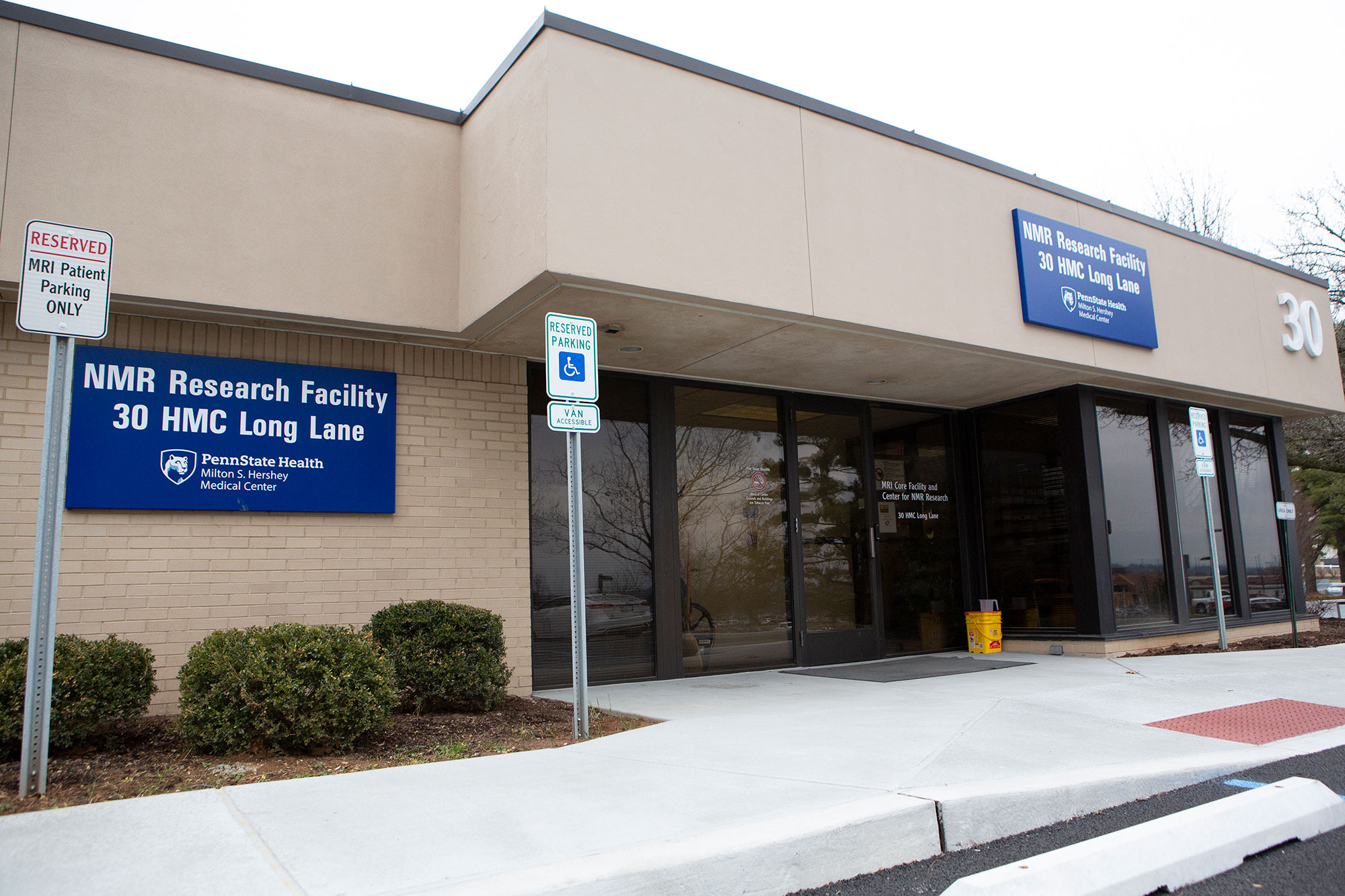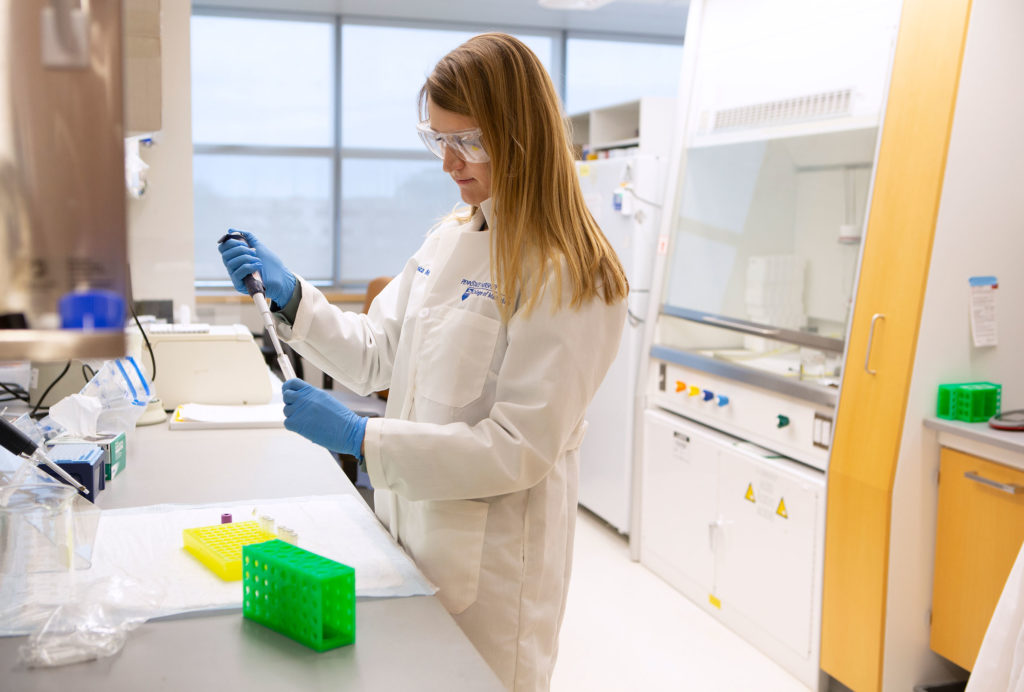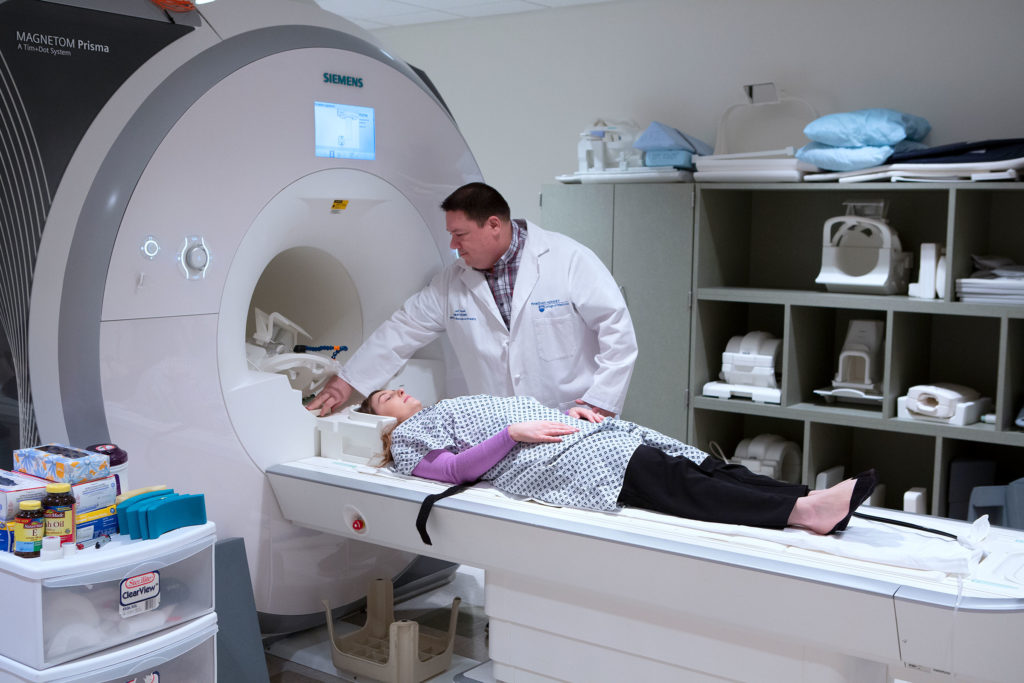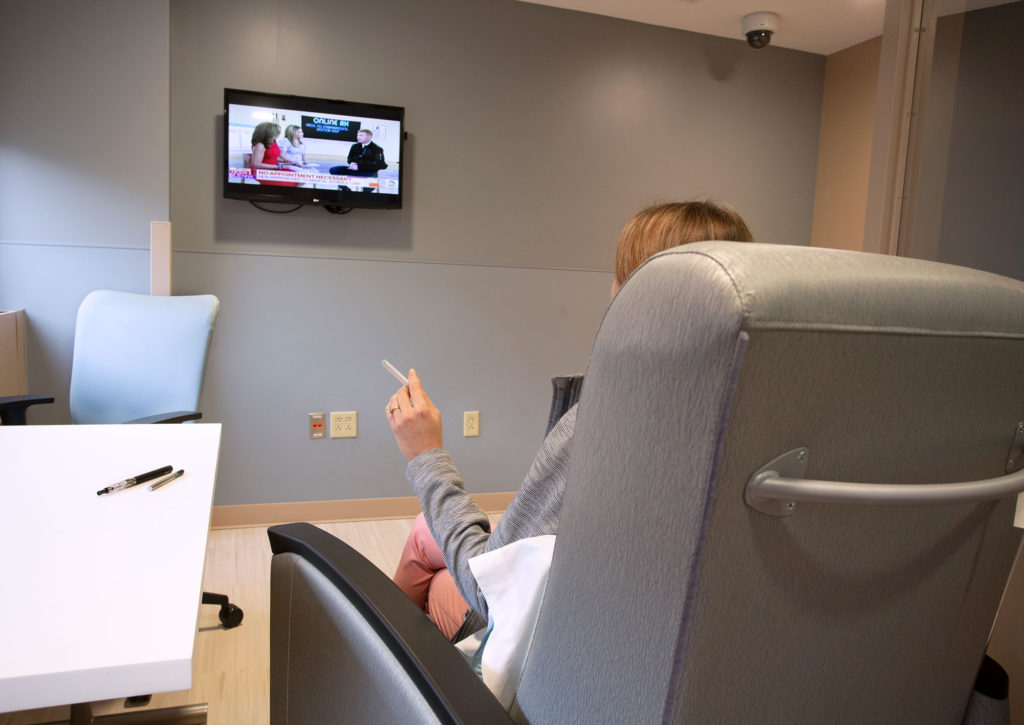The background image is A woman, who is visible out-of-focus, holds e-cigarettes.
Welcome to Penn State Center for Research on Tobacco and Health
Penn State Center for Research on Tobacco and Health’s mission is to be a national leader of scientific discovery that will translate into effective interventions and policies to reduce tobacco-caused harm in our communities.
The center comprises a multidisciplinary team of experts, including basic scientists, public health researchers and medical professionals, all dedicated to improving the lives of people touched by tobacco and nicotine addiction. It is based at Penn State College of Medicine and Penn State Health Milton S. Hershey Medical Center in Hershey, Pa.
More than 16 million Americans are living with a disease caused by smoking. Across the world, tobacco is the leading cause of preventable death. The center’s overall goal is to conduct innovative research that will inform future policymaking on tobacco and health, investigate the toxicology and addictiveness of new and existing tobacco products and discover new treatments for addiction.
Two hands with the palms facing up hold items. The right hand contains an electronic cigarette. The left holds five cigarettes.
The College is one of just seven sites across the country to receive the grant as part of the Food and Drug Administration (FDA) and National Institutes of Health’s (NIH) Tobacco Centers of Regulatory Science (TCORS) funding that was awarded in the fall of 2023.
The TCORS award will fund a trio of studies, led by the College’s Center for Research on Tobacco and Health, that explore how the design of alternative tobacco products can affect their toxicity and addictiveness.
“Our center is unique in that we are addressing both the chemical toxicity of tobacco products (the part that causes harms directly to the human body), and the addictiveness of tobacco products (the characteristic that results in people using tobacco products for decades rather than a few months or years),” said Jonathan Foulds, PhD, one of the principle investigators. “It is the combination of these two factors that determines the overall health effects.”
Current studies
The Center for Research on Tobacco and Health is currently conducting several studies on nicotine, smoking and health.Some of the studies are for people who are not planning to quit, and some are for people interested in quitting in the next 30 days.
See if you qualify for any current studies
Researchers will contact you about any available studies that you may qualify for. Interested participants may also call 844-207-6392 for details.Driving and parking directions

The Center for NMR Research is at 30 Long Lane in Hershey, Pa.

The Clinical Research Center is a dedicated space on the fourth floor of Penn State Health Milton S. Hershey Medical Center.
Study visits for people participating in smoking studies through the Center for Research on Tobacco and Health will either take place in the Clinical Research Center or the Center for NMR Research on the campus of Penn State Health Milton S. Hershey Medical Center and Penn State College of Medicine in Hershey, Pa.
Smoking cessation resources
For those who smoke and want to quit, Penn State Center for Research on Tobacco and Health and Penn State Health offer information, options and free smoking cessation classes.Contact the center
Some of the studies are for people who are not planning to quit, and some are for people interested in quitting in the next 30 days.
See if you qualify for any current studies

The Center for NMR Research is at 30 Long Lane in Hershey, Pa.

The Clinical Research Center is a dedicated space on the fourth floor of Penn State Health Milton S. Hershey Medical Center.
Study visits for people participating in smoking studies through the Center for Research on Tobacco and Health will either take place in the Clinical Research Center or the Center for NMR Research on the campus of Penn State Health Milton S. Hershey Medical Center and Penn State College of Medicine in Hershey, Pa.
The background image is An abstract background image based on Penn State's signature shield shape
Faculty
Meet the faculty members who are part of the Center for Research on Tobacco and Health.
Staff
Meet the staff who support the Center for Research on Tobacco and Health.
Trainees
See information on those completing their training at the Center for Research on Tobacco and Health.
Current trainees
Former trainees
Center history
The Penn State Center for Research on Tobacco and Health originally began in 2013 when investigators at Penn State (PIs: Joshua Muscat and Jonathan Foulds) were awarded one of 14 Tobacco Centers of Regulatory Science (TCORS), a five-year, $20 million center grant, from the U.S. Food and Drug Administration and the National Institutes of Health. The general purpose of the TCORS grants are to support scientific research to inform the regulation of tobacco products. The overarching goal of the Penn State TCORS was to understand the health impact of tobacco-harm reduction policies in vulnerable (e.g. low socioeconomic status, mental disorders) and minority populations.
The TCORS 2013 program included three separate projects:
- Switching to progressively reduced nicotine content cigarettes in smokers with lower socioeconomic status (PIs: Joshua Muscat and Kimberly Horn, George Washington University)
- Reduced nicotine cigarettes in smokers with mood and anxiety disorders (PIs: Jonathan Foulds and Eden Evins, Harvard University)
- Switching to reduced oxidant or nicotine content cigarettes in smokers (PI: John Richie)
In 2023, the Center for Research on Tobacco and Health was awarded one of seven TCORS grants (PIs: Joshua Muscat and Jonathan Foulds), which aims to better understand how physical design and chemical constituents affect the toxicity and addictiveness of nicotine and tobacco products. The TCORS 2023 program will draw on the expertise of many researchers at Penn State including biochemists, statisticians, clinical psychologists, health behaviorists and epidemiologists.
The TCORS 2023 program includes three separate projects:
- Translational Studies on Temperature and Solvent Effects on Electronic Cigarette-Derived Oxidants (PIs: Zachary Bitzer and Thomas Spratt)
- Oxidative Stress and Harmful Constituent Levels Associated with Little Cigars (PI: Joshua Muscat)
- Randomized Placebo-controlled Trial of Nicotine Pouches in Smokers (PIs: Jonathan Foulds and Jason Robinson, University of Texas MD Anderson)
A component of each of the TCORS grants is to incorporate training and funding opportunities for early career, non-tenured scientists interested in pursuing tobacco regulatory science research. Scholars in the TCORS 2013 program completed a series of courses on tobacco regulation, the epidemiology of smoking and biomarkers, and participated in networking events with scholars from other TCORS institutions. The program also supported several postdoctoral scholars who have now moved onto to scientific careers in FDA’s Center for Tobacco Products or as tenure-track professors.
Additionally, the TCORS 2013 program provided pilot funding to 15 Penn State investigators. Projects funded ranged from studies evaluating the impact of electronic cigarette use among HIV positive smokers to evaluating free radical production from charcoal filters.
The newly funded TCORS will again announce pilot award opportunities. Openings for pre-doctoral and post-doctoral positions will also be posted. Both of these mechanisms will advance the careers of upcoming and early stage researchers who are interested in pursuing tobacco regulatory science.
Finally, the Penn State Center for Research on Tobacco and Health is designed to facilitate and coordinate not only the goals and accomplishments of the TCORS grants, but also all research on nicotine and tobacco conducted by Penn State faculty. The goal of the Center is to produce synergy and create collaborations between interdisciplinary researchers who are interested in understanding addiction and reducing the health effects of nicotine and tobacco products.
Resources
Nicotine Dependence Index
The Penn State Nicotine Dependence Index was developed by Dr. Jonathan Foulds in 2011.
This 10-item scale (with scores ranging from 0 to 20) was developed to measure nicotine dependence across all nicotine product types, and an adapted version was the first dependence measure designed to evaluate electronic cigarette dependence.
The index is available for use by clinicians and researchers at other institutions using the proper citation.
See more about the Dependence IndexMRI Electronic Aerosol Delivery System (MEADS)
The MRI Electronic Aerosol Delivery System was developed through a collaboration between the Center for Research on Tobacco and Health, the Center for NMR Research and University Park.
The device works in coordination with an olfactometer to deliver up to four e-cigarette aerosols for functional MRI experiments.
With questions on this device, contact Dr. Andrea Hobkirk or Dr. Zachary Bitzer.
See protocol paper in Substance Abuse: Research and Treatment
Facilities
A number of facilities are available for smoking and tobacco research at Penn State.
The Clinical Research Center is a dedicated space on the fourth floor of Penn State Health Milton S. Hershey Medical Center.

The Center for NMR Research is at 30 Long Lane in Hershey, Pa.

Laboratory space for the Center for Research on Tobacco and Health is available on the third floor of Penn State Cancer Institute.

The MRI laboratory is part of the Center for NMR Research at Penn State College of Medicine.

Penn State is also home to this human smoking and addiction laboratory space.

Penn State Center for Research on Tobacco and Health also makes use of this smoking health and behavior laboratory at Penn State University Park.
Current research funding
The following list shows a selection of current research grant funding for Center for Research on Tobacco and Health faculty members.
Publications
The following list shows recent publications by Center for Research on Tobacco and Health faculty and staff members.
In the news
The following list shows selected mentions of the work of Center for Research on Tobacco and Health investigators in local and national media.
- Faculty
- Staff
- Trainees
- Center history
- Resources
- Facilities
- Current research funding
- Publications
- In the news
Current trainees
Former trainees
The Penn State Center for Research on Tobacco and Health originally began in 2013 when investigators at Penn State (PIs: Joshua Muscat and Jonathan Foulds) were awarded one of 14 Tobacco Centers of Regulatory Science (TCORS), a five-year, $20 million center grant, from the U.S. Food and Drug Administration and the National Institutes of Health. The general purpose of the TCORS grants are to support scientific research to inform the regulation of tobacco products. The overarching goal of the Penn State TCORS was to understand the health impact of tobacco-harm reduction policies in vulnerable (e.g. low socioeconomic status, mental disorders) and minority populations.
The TCORS 2013 program included three separate projects:
- Switching to progressively reduced nicotine content cigarettes in smokers with lower socioeconomic status (PIs: Joshua Muscat and Kimberly Horn, George Washington University)
- Reduced nicotine cigarettes in smokers with mood and anxiety disorders (PIs: Jonathan Foulds and Eden Evins, Harvard University)
- Switching to reduced oxidant or nicotine content cigarettes in smokers (PI: John Richie)
In 2023, the Center for Research on Tobacco and Health was awarded one of seven TCORS grants (PIs: Joshua Muscat and Jonathan Foulds), which aims to better understand how physical design and chemical constituents affect the toxicity and addictiveness of nicotine and tobacco products. The TCORS 2023 program will draw on the expertise of many researchers at Penn State including biochemists, statisticians, clinical psychologists, health behaviorists and epidemiologists.
The TCORS 2023 program includes three separate projects:
- Translational Studies on Temperature and Solvent Effects on Electronic Cigarette-Derived Oxidants (PIs: Zachary Bitzer and Thomas Spratt)
- Oxidative Stress and Harmful Constituent Levels Associated with Little Cigars (PI: Joshua Muscat)
- Randomized Placebo-controlled Trial of Nicotine Pouches in Smokers (PIs: Jonathan Foulds and Jason Robinson, University of Texas MD Anderson)
A component of each of the TCORS grants is to incorporate training and funding opportunities for early career, non-tenured scientists interested in pursuing tobacco regulatory science research. Scholars in the TCORS 2013 program completed a series of courses on tobacco regulation, the epidemiology of smoking and biomarkers, and participated in networking events with scholars from other TCORS institutions. The program also supported several postdoctoral scholars who have now moved onto to scientific careers in FDA’s Center for Tobacco Products or as tenure-track professors.
Additionally, the TCORS 2013 program provided pilot funding to 15 Penn State investigators. Projects funded ranged from studies evaluating the impact of electronic cigarette use among HIV positive smokers to evaluating free radical production from charcoal filters.
The newly funded TCORS will again announce pilot award opportunities. Openings for pre-doctoral and post-doctoral positions will also be posted. Both of these mechanisms will advance the careers of upcoming and early stage researchers who are interested in pursuing tobacco regulatory science.
Finally, the Penn State Center for Research on Tobacco and Health is designed to facilitate and coordinate not only the goals and accomplishments of the TCORS grants, but also all research on nicotine and tobacco conducted by Penn State faculty. The goal of the Center is to produce synergy and create collaborations between interdisciplinary researchers who are interested in understanding addiction and reducing the health effects of nicotine and tobacco products.
Nicotine Dependence Index
The Penn State Nicotine Dependence Index was developed by Dr. Jonathan Foulds in 2011.
This 10-item scale (with scores ranging from 0 to 20) was developed to measure nicotine dependence across all nicotine product types, and an adapted version was the first dependence measure designed to evaluate electronic cigarette dependence.
The index is available for use by clinicians and researchers at other institutions using the proper citation.
MRI Electronic Aerosol Delivery System (MEADS)
The MRI Electronic Aerosol Delivery System was developed through a collaboration between the Center for Research on Tobacco and Health, the Center for NMR Research and University Park.
The device works in coordination with an olfactometer to deliver up to four e-cigarette aerosols for functional MRI experiments.
With questions on this device, contact Dr. Andrea Hobkirk or Dr. Zachary Bitzer.
See protocol paper in Substance Abuse: Research and Treatment

The Clinical Research Center is a dedicated space on the fourth floor of Penn State Health Milton S. Hershey Medical Center.

The Center for NMR Research is at 30 Long Lane in Hershey, Pa.

Laboratory space for the Center for Research on Tobacco and Health is available on the third floor of Penn State Cancer Institute.

The MRI laboratory is part of the Center for NMR Research at Penn State College of Medicine.

Penn State is also home to this human smoking and addiction laboratory space.

Penn State Center for Research on Tobacco and Health also makes use of this smoking health and behavior laboratory at Penn State University Park.
